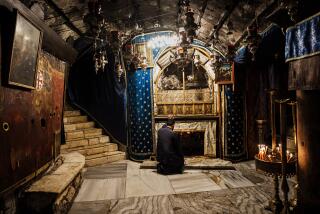Opinion: Christians are being persecuted, and the U.S. should support them
It’s an exaggeration to say that a worldwide war is being waged against Christians. But Christians in Africa and the Middle East are subject to shocking persecution -- real persecution, not the imaginary persecution some American Christians see in the legalization of same-sex marriage or the requirement that employee health plans contain coverage for contraception
This week Pope Francis received Meriam Ibrahim, the Sudanese Christian woman who was sentenced to death by a Sudan court in May for illegally abandoning the Muslim faith. (Ibrahim insists that she was never a Muslim and was raised a Christian by her Ethiopian Orthodox mother.)
Meanwhile, there has been another exodus of Christians from the Iraqi city of Mosul, now under the control of the fundamentalist Al Qaeda offshoot known as the Islamic State. Christians there were ordered to convert to Islam, leave the city or face death. “For the first time in the history of Iraq, Mosul is now empty of Christians,” said Patriarch Louis Sako, the head of the Chaldean Catholic Church.
These attacks on Christians are outrageous on two levels.
First, any coercion in matters of religion is wrong. The Universal Declaration of Human Rights adopted by the United Nations in 1948 says: “Everyone has the right to freedom of thought, conscience and religion; this right includes freedom to change his religion or belief…” Those who subscribe to these principles should be as outraged by Christian oppression of Muslims as they are by Muslim oppression of Christians. (Not all of those who complain of a war against Christians take such a disinterested view.)
But the attacks on Christians and their exodus from places where they long have dwelt are tragic in a different sense. You don’t have to be a Christian chauvinist -- or even a Christian -- to lament the destruction or diminution of ancient Christian communities in the Middle East or North Africa, whether caused by persecution, war or even economic upheaval.
Iraq is a particularly poignant case. Many Christians in Iraq (and Iran) belong to two communities, the Chaldeans and Assyrians, who predate the spread of Islam and follow ancient liturgies with a Semitic rather than Greek or Latin character. In recent years, Western Christians have rediscovered and learned from the traditions of these Christian communities.
The declining Christian presence not just in Iraq but in other parts of the Middle East impoverishes those regions culturally and even economically. As the Los Angeles Times noted in an editorial in 2008, “a vibrant Christian population has benefited predominantly Islamic countries, not least by building cultural, educational and political bridges to the West.” Moreover, religious pluralism often brings political pluralism along with it.
There was some controversy when Congress passed a law requiring the establishment of an Office of International Religious Freedom at the State Department and instructed the president to appoint an ambassador at-large for international religious freedom (an office President Obama was slow to fill). But it’s important that the U.S. stand up for religious freedom and call out countries and political movements that violate it. Meriam Ibrahim’s next stop should be a reception at the White House.
Follow Michael McGough on Twitter @MichaelMcGough3
More to Read
A cure for the common opinion
Get thought-provoking perspectives with our weekly newsletter.
You may occasionally receive promotional content from the Los Angeles Times.











